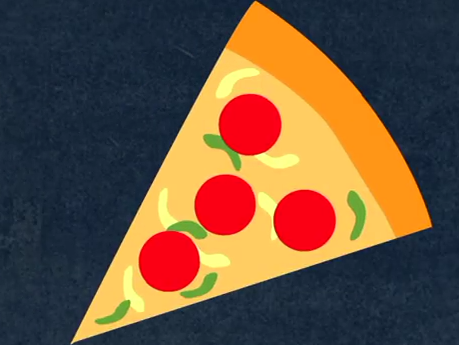The important thing about units is that once we've made a new unit, we can treat it just like we did the old unit.
重要的是,一旦我們創(chuàng)造了新的單位,就能用舊單位那樣的方法使用它。
We can compose composed units, and we can partition partitioned units.
我們可以組成組合單位,也可以分成分割單位。
Think about toaster pastries.
想想看那些零食。
They come in packs of two, and then those packs get put together in sets of four to make a box.
它們兩片包成一袋,然后再把四袋放在一起變成一盒。
So when I buy one box of toaster pastries, am I buying one thing, four things, or eight things?
所以我買一盒零食時,我是買了一個、四個、還是八個?
It depends on the unit.
這取決于單位。
One box, four packs, eight pastries.
一盒、四袋、八片。
And when I share a slice of pizza with a friend, we have to cut "it" into two smaller pieces.
當我跟朋友分享一片披薩時,我們必須將它切成更小的兩片。
So a box of toaster pastries is composed of composed units, and when I split a slice of pizza, I'm partitioning a partitioned unit.
所以一盒零食是由一個組合單位組成的,而當我切開一片披薩時,我正在切出一個分割單位。
But what does that have to do with math?
但這些到底跟數(shù)學有什么關系?
In math, everything is certain.
數(shù)學中,所有東西都是確定的。
Two plus two equals four, and one is just one.
2加2等于4,1就是1。
But that's not really right.
但也不盡然。
One isn't always one.
1不一定永遠是1。
Here's why: we start counting at one, and we count up to nine: 1,2,3,4,5,6,7,8,9, and then we get to 10, and in order to write 10, we write a one and a zero.
這就是原因:我們從1開始數(shù)一直數(shù)到9──1、2、3、4、5、6、7、8、9,接下來就數(shù)到10了,而為了寫下10這個數(shù)字,我們寫了一個1和一個0。

That one means that we have one group, and the zero helps us remember that it means one group, not one thing.
其中的1就表示我們有了一個群組,而0幫助我們記得它是指一組,而不是一個。
But 10, just like one, just like a dozen eggs, just like an egg, 10 is a unit.
但是10就像1、一打雞蛋或一顆雞蛋一樣,是一個單位。
And 10 tens make 100.
而十個10就構成了100。
So when I think about 100, it's like the box of toaster pastries.
所以當我們在想100是什么的時候,它就像那一盒零食。
Is 100 one thing, 10 things or 100 things?
100是一個、10個或是100個東西?
And that depends on what "one" is, it depends on what the unit is.
這取決于那個“一”指什么,它的單位是什么。
So think about all the times in math when you write the number one.
所以碰到數(shù)學需要寫一的時候,要一直想著這件事。
No matter what place that one is in, no matter how many things that one represents, one is.
不管這個一是放在哪個位置,不管這個一里有多少東西,它就是一。


